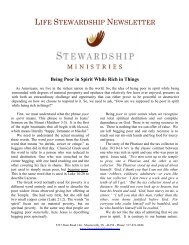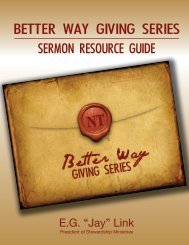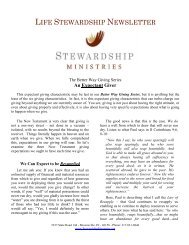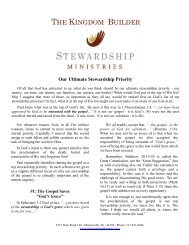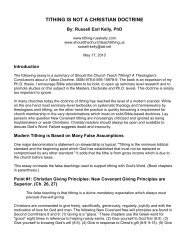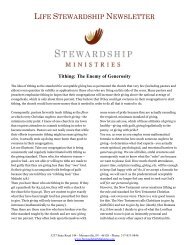âWill a Man Rob God?â (Malachi 3:8) - Biblical Foundations
âWill a Man Rob God?â (Malachi 3:8) - Biblical Foundations
âWill a Man Rob God?â (Malachi 3:8) - Biblical Foundations
You also want an ePaper? Increase the reach of your titles
YUMPU automatically turns print PDFs into web optimized ePapers that Google loves.
4<br />
Abraham does not discuss him tithing. 15 A few factors are present which argue against this being<br />
a reference to systematic tithing.<br />
First, the offering in Gen 14:20 was made to Melchizedek, the priest. If Abraham was<br />
tithing consistently, who received the other tithes? Did Melchizedek engage in an itinerant<br />
ministry and collect tithes on behalf of <strong>God</strong>? 16 Second, the same verse states that Abraham gave<br />
a tenth of what “he recovered.” Hebrews 7:4 refers to Abraham giving a tenth of the “spoils,” not<br />
continuously giving a tenth of all of his possessions for the rest of his life. The present passage<br />
likewise does not indicate that Abraham continually gave a tenth of his increase. 17 The<br />
modifying phrase “he recovered” also suggests that this was a one-time action rather than a<br />
continual pattern. Third, some have argued that Abraham was following the Mosaic Law prior to<br />
it being given, as it were. However, according to Num 31:27–29, people were commanded to<br />
“set apart one out of every five hundred [of the spoils] as the LORD’s share” and to give it to the<br />
priest as an offering to the LORD. Hence the amount for spoils won in victory stipulated in the<br />
Mosaic Law is different from what Abraham actually offered Melchizedek in Gen 14. For this<br />
reason the argument that Abraham in Gen 14 gave to Melchizedek a tithe in accordance with the<br />
Mosaic Law is invalid, since there a different amount for the giving of spoils is prescribed.<br />
To sum up, then, Abraham gave a tenth of his spoils 18 to Melchizedek; but the Mosaic<br />
Law gives a different computation of what is required in victory. 19 The argument that tithing was<br />
consistently practiced from at least Abel onward is therefore invalidated at this point. Abraham’s<br />
offering is not consistent with the requirements of the Mosaic Law. 20 This does not constitute a<br />
contradiction. It simply demonstrates that Abraham’s gift to Melchizedek should be distinguished<br />
from the Mosaic Law’s prescriptions for tithing.<br />
Finally, an argument from silence exists and works in two ways. On the one hand, those<br />
who contend that tithing is not mandatory in this time period argue that since the text never states<br />
that Abraham tithed continuously, we should take this at face value and conclude that he did not<br />
15 Note how Wenham views Melchizedek in contrast to the king of Sodom. He proposes a chiastic structure that<br />
demonstrates that this passage is primarily intended to contrast those two characters: the meanness of the king of<br />
Sodom versus the generosity of Melchizedek (Genesis 1–15, 315–16, 318). Wenham also suggests that the purpose<br />
of the references to both Abraham and Jacob’s tithes was to provide historical support for the practice which was<br />
established in the Mosaic Law (ibid., 317). See also Allen P. Ross, “Jacob’s Vision: The Founding of Bethel,” BSac<br />
142 (1985): 234; Jacob Milgrom, Cult and Conscience: The Asham and the Priestly Doctrine of Repentance (SJLA;<br />
Leiden: Brill, 1976), 61.<br />
16 See Snoeberger, “The Pre-Mosaic Tithe,” 78–84, who contends that Melchizedek was most likely the king of the<br />
town of Salem and functioned as a priest for that town or clan only.<br />
17 See Stuart Murray, Beyond Tithing (Carlisle, England: Paternoster, 2002), 68.<br />
18 By “all” is meant that which Abraham took from the kings, not his possessions in general. See Emerton, “The<br />
Riddle of Genesis XIV,” 407–8.<br />
19 Cf. Emerton, “The Riddle of Genesis XIV,” 405–6, who maintains that the Gen 14 tithe and the tithe in Deut 14<br />
are different.<br />
20 See Ernest L. Martin, The Tithing Dilemma (Portland: Associates for Scriptural Knowledge, 1997), 21.



